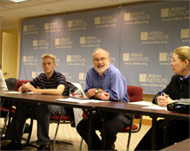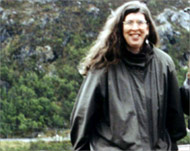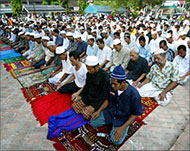US wakes up to Islam, many less informed
Since 9/11, Americans attempting to learn more about Islam have discovered that even the road to knowledge is not easy.

In the days immediately following the attacks of 11 September 2001, Sue Headlee, an assistant professor of economics at American University, began to take frequent trips to Politics and Prose, her local bookshop in Washington, DC.
Like millions of other Americans stunned by the traumatic event, Headlee had many unanswered questions. Her questions revolved around the nationalities of the hijackers and the religion in whose name they professed to have acted.
In the weeks after the attacks, stores such as Politics and Prose featured hundreds of books on the Middle East and Islam, eager to help a natiion understand one of the worst attacks ever committed on its soil.
Headlee, an assistant professor of economics at American University, says: “I felt it was important to learn more about Islam and the Middle East so that I could understand what was going on in the world, and so that I could teach my students about it.”
In the three years since the event that changed the US and the world, an assertion made throughout the national media is that Americans have taken the initiative to educate themselves about Islam and the Middle East.
The implication has been that this quest for knowledge would lead to better cultural understanding, interfaith dialogue, and ultimately, a peaceful resolution to the wide rift between East and West.
Seeking answers
Munir Shaikh, executive director of the Council on Islamic Education, a non-profit research institute, explains.
 |
|
Sales of the Quran have risen in |
“Given the fact that many media outlets opted to focus on the religion of Islam as a primary factor in international events, including acts of terrorism, Americans sought more information to either corroborate such public information or find a means to consider that information in a more informed, critical fashion.”
However, little interest has been taken in what sources Americans have turned to as they shape their view of the world’s second largest religion and its adherents.
Have these sources been helpful in bridging the divide and promoting tolerance and understanding, or have they reinforced existing stereotypes and further inflamed tensions?
Bestsellers
While there are no exact statistics on the purchase of material related to Islam, there have been trends.
One main reading source has been Islam’s holy book, the Quran.
“Personal study of the Quran and texts from the broader Islamic tradition have figured in Americans’ attempt to understand Islam, Muslims, and the Middle East,” Shaikh said.
 |
|
Professor Sue Headlee (R) |
The Maryland-based Amana Publications is one of the chief distributors of Islamic books in North America. One of its executives, Ahmad Uthman, notes that in recent months his company has had “more demand for the Quran, especially for courses taught on Islam and the Middle East”.
But Americans have also turned to the works of many different authors, with a variety of backgrounds and outlooks. For instance, in their search for answers, many in the US read books by British theologian Karen Armstrong.
The former Roman Catholic nun is the best-selling author of books such as Islam: A Short History and The Battle for God. Works by Armstrong have ranked in the top 10 in national lists of best-selling books on religion for the past three years.
Georgetown University Professor John Esposito has also been a popular choice by Americans.
As a leading US scholar on Islam, his more than 25 books have served as a tremendous resource for a long time but have been of particular significance in recent years.
As author of such books as What Everyone Needs to Know about Islam and The Islamic Threat: Myth or Reality? Esposito has attempted to tackle Western misconceptions head-on and expose their historical, cultural, and political root causes.
Reading list
Author Michael Sells also saw sales of his Approaching the Quran: The Early Revelations increase after 9/11, though this was not without controversy.
An uproar over the book emerged after the University of North Carolina assigned it as summer reading for incoming freshmen in 2002.
A lawsuit by several students that was subsequently dismissed argued that the school was indoctrinating students with deceptive claims about the peaceful nature of Islam by assigning a selective source.
In spite of the fact that many Americans attempted to educate themselves on Islam and the Middle East in the aftermath of 9/11, there has been a visible downward shift in American public opinion toward Islam.
Views on violence
A nationwide survey by the Pew Forum, released in July 2003, shows a shift in public perceptions of Islam.
Forty-four per cent of Americans agreed that Islam is more likely than other religions “to encourage violence among its believers”. In March 2002, only six months after 9/11, just 25% expressed this view.
More interestingly perhaps, this view is as prevalent among those who consider themselves knowledgeable about Islam as it is among the admittedly less educated.
|
“My conclusion is that violence and Islam are linked. The religion Bob Brown, |
An October 2003 ABC News poll found that 43% of respondents believed Islam “does not teach respect for the beliefs of non-Muslims”. This number was nearly double the 22% who expressed this view in January 2002.
These views are best summed up by one listener’s response to a National Public Radio survey about the effects of 9/11 on life in the US.
“Like most Americans I knew little about Islam before 9/11. I have learned much about it since then. My conclusion is that violence and Islam are linked. The religion breeds violence,” Bob Brown wrote on NPR’s website.
Remarks such as these beg the question: How are Americans formulating such perceptions through learning?
A new industry
Sarah Shields, professor of Middle East history at University of North Carolina, explains that since 9/11, Americans have become more aware that Islam exists.
“That doesn’t necessarily translate into having more accurate information than before 9/11. On the contrary, many people I encounter now have largely inaccurate information, but are under the impression that they ‘know’ Islam. Before, they didn’t know about Islam and knew they didn’t know.”
These many misperceptions may be explained by the plethora of new reading materials that inform such views.
Also on the bestseller lists since 9/11 have been books that many observers characterise as promoting the notion of Islam as a violent, alien faith that is incompatible with Western values.
Invective
Works by authors such as Middle East scholar Bernard Lewis fall into this category.
In the shadow of the Bush administration’s “war on terror”, titles such as The Crisis of Islam: Holy War and Unholy Terror, What Went Wrong? The Clash between Islam and Modernity in the Middle East, The Trouble with Islam, and Holy Blood, Holy Grail have all lined the shelves of America’s top chain booksellers, and more increasingly, the homes of millions of people in the US.
 |
|
Sarah Shields says Americans |
“A new industry seems to have been created to answer people’s questions about Islam, but from a variety of viewpoints that are based on considerations that are peripheral to Islam,” Shields explained.
“Some discuss Islam from the point of view of US interests, others from the perspective of potential new threats, and still others from concerns about Islam as violent heresy.
“I wonder if the new context in which people seek information leads to the kind of skewed knowledge that is circulating,” she continued.
Dwindling options have become more of a serious concern.
While they welcome the popularity of authors such as Armstrong and Esposito, Islamic publishers none the less worry that others too often define all the religion, giving the American public a limited viewpoint.
“A lot of people complain that they don’t find our books in mainstream bookstores,” Uthman said.
Educational trends
As some see it, misinformation is partly the result of political developments since 9/11, which have had the most profound influence on how Americans view Islam.
“The current administration’s decision to remove the Taliban from power and retaliate against Usama bin Ladin in 2002, followed by its decision in March 2003 to invade Iraq, has polarised the American public,” said Shaikh.
 |
|
Islam is perhaps one of the most |
This polarisation is one explanation for the conflicting results of public opinion surveys.
In response to the same NPR poll about life since 9/11, Kathleen Barton wrote: “I take a greater interest in our foreign policy. While I’ve always considered it important, I felt so far removed from it. Now it feels a lot closer to home. I think we need to work hard at improving our policies.”
In the final analysis, evidence suggests that Americans attempting to educate themselves has not necessarily translated into a more informed public.
An October 2003 ABC News poll shows that 73% of Americans do not feel they “have a good basic understanding of Islam’s beliefs and tenets”, up from 61% in January 2002.
According to the poll’s analysts, Steven Waldman and Deborah Caldwell: “This suggests that any additional information people have gleaned about Islam has confused more than clarified.”
Mixed bag
Under the shadow of complex global events, preconceived notions, and pre-packaged solutions by political leaders and media commentators, some contend that the road to a lucid understanding of the world’s most misunderstood faith will continue to be long and arduous.
Shaikh perceives: “A fundamental problem that constrains many Americans’ attempts to understand Islam and the Middle East is the presumption of ‘otherness’ about much of the rest of the world.”
He concludes, however, with a more positive outlook.
“We Americans are continuing to learn how to recognise that while we are a leading nation, we are part of an integrated and diverse community of nations comprised of people with legitimate variations of values, beliefs, and priorities.”